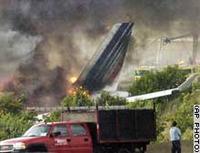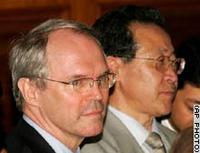I don't really keep up with the news - at least, not in a timely manner. I'll find out eventually that Putin pocketed an iced-out Superbowl ring out in Moscow, sure, but not in time enough to brag about keeping up with the pace of things. That said, by now doubtless you've all heard of the AirFrance Airbus A340 that skidded down a rainslick runway in Toronto and burst into into flames. You've heard that miraculously, nobody was killed. You and Le Parisien both have proclaimed, "The Miracle of the Air France Airbus."
 It's the first A340 crash in 13 years of service. And amid disintegrating steel and burning fuel, you'd imagine three hundred and nine people vanishing into flame. Choking as the oxygen was consumed. Instead, they've all emerged virtually unscathed. This is heartening. Now here's why I'm thinking about the crash, when - after all - you could just be reading CNN.com.
It's the first A340 crash in 13 years of service. And amid disintegrating steel and burning fuel, you'd imagine three hundred and nine people vanishing into flame. Choking as the oxygen was consumed. Instead, they've all emerged virtually unscathed. This is heartening. Now here's why I'm thinking about the crash, when - after all - you could just be reading CNN.com.The reason for the crash? The severe thunderstorm that rocked Toronto late yesterday. The same weather system, I'd imagine, that found its way over my apartment building last night. The same towers of clouds that cracked open a jet over concrete and set it on fire shook my windows just a few hours later. At 4:03 p.m., EST, August 2, 2005, at the same time that I was using a Laser Radio Transmission gun to scan men's pants in a rat-infested basement, three hundred-odd people were running for their lives on a little flat patch of rocky ground next to a gully.
 And at the same time as three hundred people ran for their lives from an exploding airplane and lightening flashed, Christopher R. Hill and Akitaki Saiki ducked out of a North Korean conference room to grab some coffee as six nations continued largely unsuccessful nuclear proliferation talks.
And at the same time as three hundred people ran for their lives from an exploding airplane and lightening flashed, Christopher R. Hill and Akitaki Saiki ducked out of a North Korean conference room to grab some coffee as six nations continued largely unsuccessful nuclear proliferation talks.At the same time as the lead American and Japanese negotiators took a coffee break in North Korea, police in Belarus had battered down the door of a dingy apartment decorated with the Polish flag, the headquarters of a cultural group of ethnic Poles. Minsk authorities worry that the Poles are fomenting revolution. At just about the same moment that Akitaki Saiki burned his tongue on black coffee and Roel Bramer's vision blurred as he ran from fire and I pulled another stack of Lightweight Dress Chinos, a police officer in Belarus who refuses to be named stood in the center of the apartment and pencilled an inventory of subversive items into a little black notebook he carried with bent steel spirals. Item number one was the flag. Behind him, somebody was getting hit in the face with a truncheon.
And at more or less the exact same time, Michael Roach, recently retired from Australia's Security Intelligence Organization, sweated under newsman lights and, reading from a prepared statement typed onto thin white computer paper, said that Australia faces an imminent risk of a terrorist attack. The reporter from the Australian Broadcasting Corp. nodded seriously as Christopher R. Hill picked up his coffee. "The threat," Michael Roach said, television makeup running on his forehead in more or less the same way that sweat salty with terror was runnning down the gasping face of Roel Bramer, "is real. It's a matter of when it will happen."
Four hours later, I saw the same lightening that split an A340 like an egg strike down in the South End. Christopher R. Hill waxed pessimistic to a reporter on the way back to his hotel room. Rain extinguished Toronto flames. Shock blankets were being wrapped around the survivors. Police tape fluttered across a kicked-in apartment door. Michael Roach woke up early to go running.

No comments:
Post a Comment